Security, legality, and politics collide in the J&K debate
The recent plea by Jammu and Kashmir Chief Minister Omar Abdullah urging the Centre to restore full statehood to the Union Territory has reignited a complex and highly sensitive debate—one that balances democratic aspirations against national security imperatives. While the National Conference-led government argues that normalcy is returning and that the time is ripe to roll back central control, the Modi government appears to be treading cautiously. And for good reason.
Omar Abdullah’s call comes amid signs of relative calm in the region. With a democratically elected government back in place after years of direct central rule, proponents of statehood argue that restoring the constitutional dignity of Jammu and Kashmir is both timely and necessary. Political representation, after all, rings hollow if it operates under the shadow of curtailed autonomy.
However, the Centre is unlikely to act on sentiment alone. Though elections may have brought back civilian governance, the broader picture is still fraught with risks. The fragile peace is punctuated by persistent security threats, especially along the Line of Control (LoC) and international border. Despite improvements in the law-and-order situation, the Indian Army continues to engage in counter-infiltration operations, with recent reports confirming the neutralization of several Pakistan-sponsored terrorists attempting to cross into Indian territory.
It’s no secret that border districts like Kupwara, Rajouri, and Poonch remain volatile. Intelligence inputs suggest that Pakistan continues to push trained militants across the border, often under the cover of ceasefire violations. The Army recently issued a stern warning to Pakistan following multiple breaches of the ceasefire agreement—incidents interpreted as attempts to provide “fire cover” for infiltrating terrorists.

In this context, restoring statehood, which could reduce the Centre’s direct administrative grip, is viewed by some in the security establishment as a premature risk. The current Union Territory status allows for tighter coordination between civil administration and security agencies—a synergy that has been critical in containing militant activity.
Adding a layer of complexity is the recent Supreme Court judgment that may have far-reaching implications for center-state relations. In a landmark verdict on April 8, a bench of Justices JB Pardiwala and R Mahadevan ruled that the President must decide on bills reserved for her assent within a three-month window from the date of submission by the governor. The ruling came in response to a case filed by the Tamil Nadu government over pending bills.
The judgment further stated that if the President withholds assent, state governments can directly approach the apex court. In the wake of this decision, Tamil Nadu promptly notified 10 bills that had been long held in limbo, citing the “deemed assent” doctrine upheld by the court.
This has unsettled the Centre, which reportedly plans to file a review petition against the judgment—not just to revisit the timeline but also to contest the idea of “deemed assent” and the direct access given to states. If the petition is filed, it will be heard by the same bench that issued the original verdict.
Why is this legal development relevant to the Jammu and Kashmir question? Because statehood would restore legislative autonomy, including the power to pass bills—potentially controversial ones—without central pre-clearance. The Centre fears that, in a politically volatile region, this could open the door to legislation that might complicate national security or diplomatic relations.
Restoring statehood in such a scenario, especially when coupled with a court-mandated timeline for Presidential assent, might limit the Centre’s ability to scrutinize sensitive legislation. The stakes are simply too high to gamble on trust alone.
Ultimately, the Modi government finds itself walking a tightrope. On one hand, it must respect democratic sentiment and uphold the legitimacy of an elected government in Jammu and Kashmir. On the other hand, it must safeguard national interests in a region that remains a hotbed of cross-border tension and insurgency.
The Centre’s cautious posture suggests that while Omar Abdullah’s demand may be heard, it may not be heeded—at least not immediately. For now, security and legal stability trump symbolic restitution. Statehood may well return to J&K, but only when the Centre believes that such a step won’t come at the cost of national security or constitutional control.






